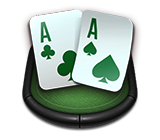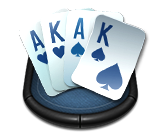
How hard can it be to play the second-best starting hand in Texas Hold’em poker? Well, there are some situations where the Kings can be a tricky hand. In this poker strategy article, we’ll help you understand what to do when an Ace appears on the flop, for instance. We’ll also look at some other common scenarios to help you maximise your winnings when holding Cowboys.
Playing Pocket Kings – The Basics
To play pocket kings like a pro, let’s start at the beginning. K-K is obviously a massively strong hand, with only A-A, the elusive pocket aces, ranking higher (elusive being a highly appropriate word when it comes to pocket aces!) To that end, it should really go without saying that you must be looking to raise preflop with this particular holding. Regardless of your starting position, if there’s no pump in front of you, you should be the one cranking up the heat. Long-term, limping is still profitable, but you’ll win less money overall than by raising.
Consider the possibility of the ace flop where you hold pocket kings. You might find yourself wondering: "What's the best play now?" This situation can put you in a tough spot, especially against an aggressive opponent. In such a scenario, it's crucial not to panic but rather to consider the odds and your opponent's potential hand range.
One common mistake often made by players who play pocket kings (even seasoned ones) is to fold immediately when an ace flops, but that is not a great idea. You must remember that not every player out there will have a bullet in their hand. Much of the time, players will play aggressively with far weaker hands, trying to represent the bullet in some way. As a result, don't let the appearance of the bullet intimidate you into folding what could still potentially be the far better hand!
But then, on the other hand, pocket kings can also dominate a lot of pair hands that your adversary might have. Take note that it is also beneficial to consider the chances of other players holding an ace, taking into account their playing style and the general action leading up to the flop. With pocket kings, it is often a game of fine balancing your aggression with more cautious play, so remember to take it steady and consider how each card changes the dynamics of the hand.
Understanding how to navigate these situations is the key to winning with pocket kings, generally speaking.
Despite their strength, pocket kings can sometimes lead to difficult decisions in later rounds. For example, how are you going to react when a bullet hits the board or when your adversary aggressively bets into you? These are scenarios where understanding the finer nuances of poker strategy is important to your strategy.
Up Against A Raise
 If the pot has already been raised, you should re-raise in almost every single situation when holding pocket kings. Definitely 3-bet 100 of the time. A good pump is around three times the size of the original bet. For instance, let’s say you’re playing $2/$4, and the villain makes it $12 to go. An optimal raise here would be something in the region of $36 to $42.
If the pot has already been raised, you should re-raise in almost every single situation when holding pocket kings. Definitely 3-bet 100 of the time. A good pump is around three times the size of the original bet. For instance, let’s say you’re playing $2/$4, and the villain makes it $12 to go. An optimal raise here would be something in the region of $36 to $42.
When facing a 3-bet, you’re still going to want to raise with kings. If you’re playing with super deep stacks against the tightest player in the world, you can make a case for folding. But 99% of the time, you’re looking to 4-bet. The raise size should be smaller than if you were 3-betting. Keep it to something like 2.5x if you’re in position and less if out of position.
It’s only really when holding A-A and K-K that you can feel absolutely delighted to come up against a 4-bet. Therefore, you can probably guess what you need to do in this spot. That’s right – re-raise all-in. Is there a case for calling and slow play it a little more slowly? Not really. What do you do if there’s a bullet on the flop? It’s not really worth it to get the money to the middle and put the other players to the test.
In poker, holding the second-best hand, such as pocket kings, doesn't necessarily guarantee a win. Your success hinges on how well you can read your opponent's actions and how accurately you can guess their holdings. Let's consider you're in a situation where the action folds to you. You have pocket kings, and you naturally open with a raise. The big blind, one player, calls. Now, what happens if an ace hits the flop? This situation can prove challenging even to seasoned players, but with our tips, we hope to guide you in making the best decision. Remember, over the course of the game, solid play pays off more than mere luck.
When Your Kings Are An Overpair
Although we all fear the Ace in this situation, more often than not your K-K will be an overpair to the board. And that’s a great spot to be in, so we need to maximise it with some aggressive betting. There’s no reason to be sneaky here. Get some chips in and look to grow the pot.
However, as always, poker is a complex game with exceptions to general rules. You could justify slow play if the flop is composed of low-value connecting cards. Something like 7-6-4 fits nicely with the range of the player who called preflop. It should be full of suited connectors and mid to low-value pocket pairs. So, be wary of straights and sets on these occasions.
This, of course, doesn't mean you should immediately fold. The key is to understand your opponent's tendencies. Are they capable of bluffing? Would they play aggressively with a draw? These are important considerations. In poker, information is power. So pay attention to your opponent's actions and try to deduce their possible holdings. This can help you make a better decision on whether to call, raise, or fold.
The money in this game is won and lost on the later streets. Your ability to navigate the turn and river could significantly impact your winnings in the long run. Here are some tips on what to do on these crucial rounds of betting. Remember, the main goal is not to have the best hand at the end but to make decisions that maximise your winnings and minimise your losses.
The best advice is to keep such pots small. A check-call approach is not a bad play here.
When An Ace Flops
 We all know that horrible feeling. Your ecstasy turns to agony after seeing plenty of pre-flop action with pocket kings, only for the dreaded Ace to hit the flop. What do you do now?
We all know that horrible feeling. Your ecstasy turns to agony after seeing plenty of pre-flop action with pocket kings, only for the dreaded Ace to hit the flop. What do you do now?
If you 3-bet or 4-bet before the flop and find a call, as irritating as it is, you need to make that continuation bet. Keep the aggression levels high. Think about your position and what kind of hands your opponent might have. Remember your range as a whole, rather than your specific hand. An Ace high flop is great for your perceived range, based on the story you told before the flop.
Remember that poker is not just about the hand you're currently playing. It's about the long run, the accumulation of small edges that will add up over time. Keep that in mind when you play, and don't let a single hand tilt you. It's all about making the best decision with the information you have at hand.
Bet small though, since you want the weaker playing hands to stick around. This is actually a value bet, rather than a bluff.
If your opponent starts to come after you, you need to come to terms with the idea of giving up. Yes, it sucks. It’s completely awful. However, a pair of pocket Kings just no longer offers much in terms of expected value (EV) in this situation.
Lots of action before the flop and lots of resistance after an Ace high flop. Think about the story your opponent is telling you. It would be suicide for them to be bluffing so aggressively in this situation. They are more than likely to be playing pocket aces. Sometimes, the most powerful move in poker is the fold. It's not always about winning the current pot but about preserving your chip stack for future opportunities where you have a better chance of winning.
Dealing With Tricky Hands
No poker hand, not even a powerhouse like pocket kings, is invincible. As you gather more experience at the table, you'll encounter situations where your K-K is up against some tricky hands. Understanding how to navigate these scenarios will be essential to your overall poker strategy.
Say you're playing from a later position and raise with your pocket kings, only to get called by the player on the big blind. The flop comes down, and it's a mixed bag - a nine, a jack, and an ace. This is a situation where your opponent's calling could mean trouble. They could be holding an ace and have you beat. But, just as likely, they might have a lower pocket pair or be chasing a straight or a flush.
Knowing your opponent's tendencies can help you decipher their actions. For instance, if they're typically tight players who only bet with premium hands, a strong bet from them after the flop could signal they've hit their ace. However, if they're looser and prone to bluffing, they might be trying to scare you off the pot.
In this scenario, your position is your strength. Since you're acting after your opponent, you can take your time to read into their actions before making your move. You might decide to see another card and call a small bet or fold if they push hard and you believe your kings are beat.
Adapting Your Strategy
Every poker player dreams of getting pocket kings, but it's crucial to adapt your strategy to the dynamics of each individual hand. Sometimes, this means making tough decisions, like folding your kings if you believe your opponent has aces or the pot odds don't justify a call. This understanding will save you from losing significant chips in a situation where you're likely beat.
On the other hand, there will be instances when you're in a powerful position with pocket kings, and it's your turn to put pressure on your opponents. For instance, if you're in a late position and the action before you has been light, a strong raise could scare off players with weaker hands and build the pot for you to win.
However, suppose an opponent is showing signs of strength - either through their betting or their physical tells - and you believe your kings are in trouble. In that case, it's essential not to get too attached to your hand. Yes, folding kings is a bitter pill to swallow, but a key aspect of poker is knowing when to cut your losses. As the old saying goes, "It's better to lose a small pot now than a big one later.
And remember, there's always the next hand. Even if your kings gets you defeated in this round, you could very well find aces in the hole on the next deal. That's the beauty of poker - every hand offers a new opportunity to win.
Conclusion
Ultimately, when you get a hand of kings in hand (in hold'em), it's like coming across a beast. Most of the time, you could almost say that the hand plays itself.
Here are the two essential tips you'll want to remember from this article: First, play them aggressively. The tactic of slow playing might not lead you to lose, but you'll fail to maximise your winnings with such a strong hand that doesn't come around all too often. Remember, in the long run, every bet counts.
Secondly, don't get overly attached to K-K when facing a barrage of aggressive action. The pot might seem enticing, but giving up such a power hand can indeed be the most challenging part of embracing Cowboys. Maintain your discipline, keep in mind your position, and decide accordingly.
Losing a sizable pot can leave a sour taste, but don't forget - there's always the next hand to look forward to. Sometimes, the aces will line up in your favour, and the winnings will start to accumulate. It's all about patience, understanding your position, and calculated aggression. Making a call when you're having problems can cause your stack to dwindle rapidly, so stay aware of the warning signs and play smart.

.webp)




























